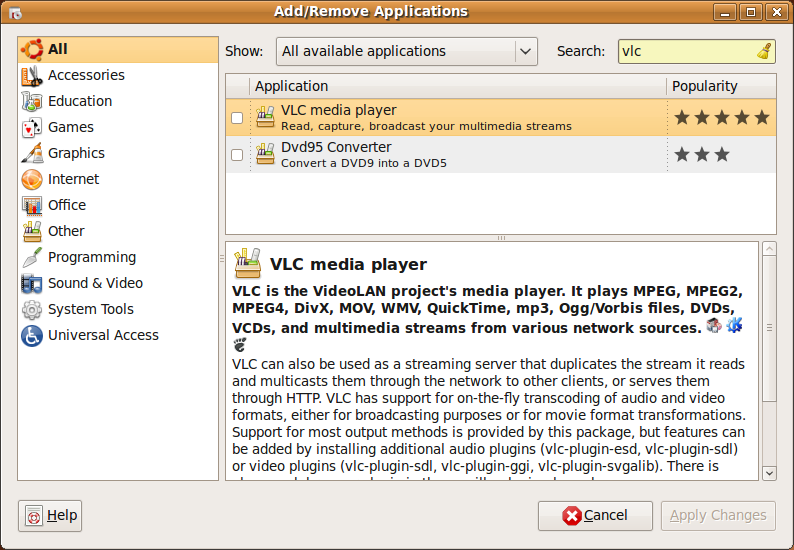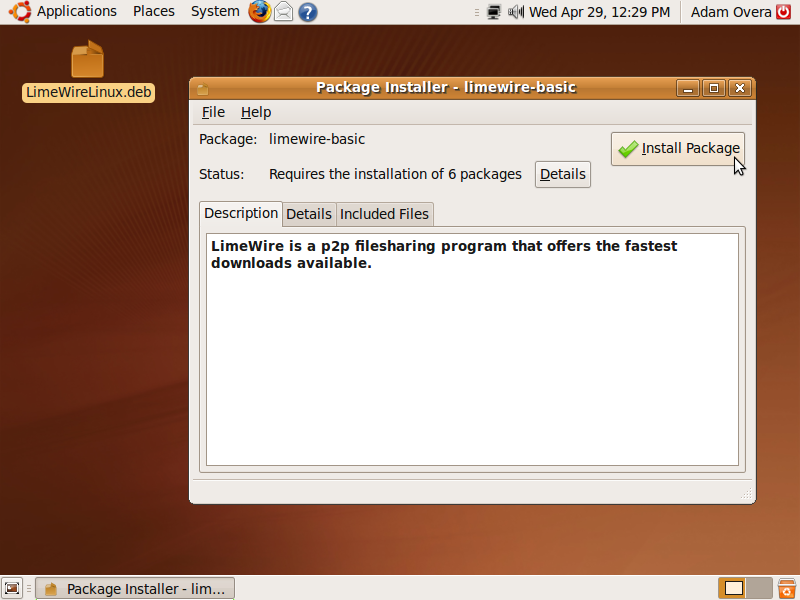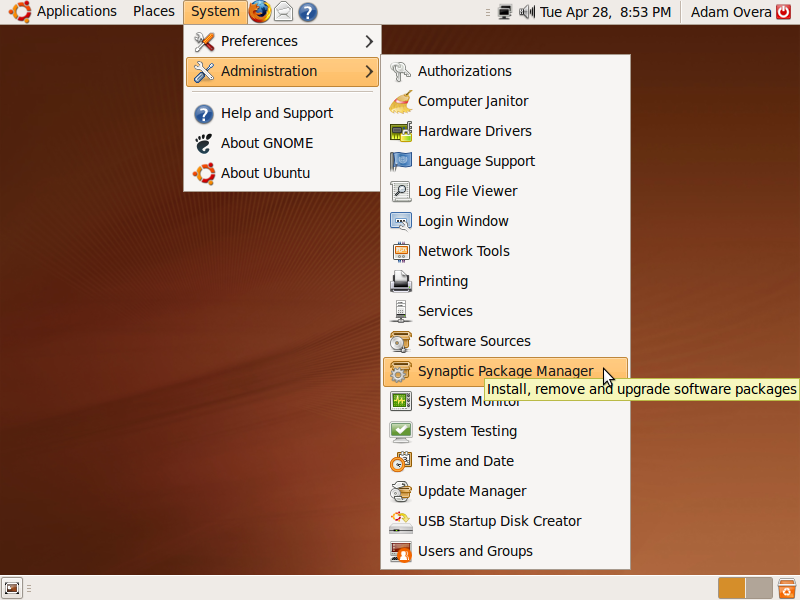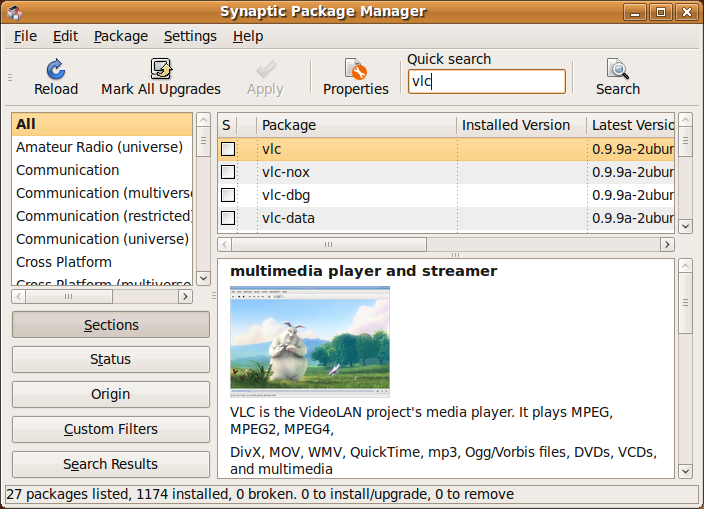Desktop Linux For The Windows Power User
How Do I Install Software?
Every user migrating from Windows to Linux has asked something along the lines of “why is installing applications in Linux like pulling teeth, when it's so easy in Windows?” But is the process in Windows really that user-friendly? To install most programs and applications in Windows, you must acquire and then double-click on an .exe file in order to run a setup script as an executable. With Linux, you simply go to Add/Remove Applications in the Applications menu to add and remove applications. To a total novice this would be a natural place to check. To a more advanced user, this is automatically discarded as a semi-effective removal-only tool, as it is in Windows.
One of the reasons that Linux is less prone to viruses and malware in general is because there are no .exe files. While an .exe holds not only the application data but also the means to install itself, Linux “packages” only hold the application data. You must run package-management software to install programs and applications. Due to strict user-account controls, you are prompted for your password whenever a package manager tries to install a package. The screen will shade and a dialog box will appear and ask you to enter your password, just like when we updated the system. Nothing will install to the root file system without your password being entered each time, meaning malicious software can't simply install itself into your system as a background process.
I'm sure that your next question is “where do I find and acquire packages?” With Windows, you can go to the store and buy software or download it from the Web. In Linux, open your package management software and you can browse the available software by category or search for a specific title in the search box. The package-management software that comes with Ubuntu is linked to a software repository database or “repo.” The Ubuntu repos have all the software packages that have been tested as compatible with your version.
If you are looking for a specific title that is not in the official repos, you can still find packages online. Ubuntu's .deb files are the closest thing to an .exe. You can download and double-click on a .deb just like you would an .exe file in Windows, while doing so will simply open a package manager. Gdebi is the package manager that will open to install .deb files.
While Add/Remove Applications is the most user-friendly way to install programs and applications, Synaptic Package Manager in the System/Administration menu can install any package (programs, applications, libraries, codecs, plug-ins, etc.). Synaptic Package Manager has all the functionality of Add/Remove Applications and then some. When you are more comfortable with Linux, you'll want to use Synaptic for package management.
Get Tom's Hardware's best news and in-depth reviews, straight to your inbox.
Current page: How Do I Install Software?
Prev Page Updating Your System Files And Drivers Next Page Codecs For Multimedia Playback-
jgv115 An easier way of installing programs is in the terminalReply
type:
sudo apt-get install *app name here*
-
DjEaZy ... i'm a n00b in LINUX, but UBUNTU... it iz a nice start... the GUI iz easy to pick up... the rest iz reading forums... i got even crysis to work in Ubuntu... just the problem waz, that there waz no textures... with WINE and DX instaled the need for speed series runs pretty fine... all OpenGL games, that i played, run fine too... the interesting thing where you can consider using Ubuntu iz a old computer for internet browsing... if tha CPU iz approx 1Ghz, tha RAM 256Mb, and a 5 series GeForce or 9 Series Radeon to do the COMPIZ eyecandy... then YOU have a better-than-Vista visual and browsing experience...Reply -
wicko Meh, I've killed my XP install and I use Windows 7, which I actually like. Ubuntu doesn't cut it for me due to the lack of games.. otherwise I'd be all for alternatives.Reply -
arpikusz Great article. Really like that you outlined how to install all the "good little stuff" and not just the OS it self. Thumbs up!Reply -
thepinkpanther as soon as ubuntu can run .exe without a hitch, windows is out the...ugh...window.Reply -
Sir you are wrong. GoogleEarth and AdobeFlash is fully 64-bit compatible.Reply
One issue that you may encounter is GoogleGears that is 32bit only, but you can easily find Gears for 64 bit (without Google trade mark). -
fordry06 Ya, I have multiple games that will not work no matter what i do. I have tried configuring WINE manually and Play on Linux and Steam games will not function properly for me, neither does Trackmania. Im not sure if its becuse i have SLI or what but it simply doesn't work. I would love to use Linux as my primary OS, but when i install Windows 7 and ALL of my drivers are installed and working correctly automatically without any hassle, even nvidia video drivers, that is something that Linux is not capable of yet with alot of systems. Until the majority of programs and drivers work natively with Linux, it will just be a niche OS on desktop computers.Reply -
ahmshaegar Well, let's get this out of the way first: Linux is my primary OS. And I realize it's a kernel, so piss off you pedantic bastards.Reply
@thepinkpanther: Linux ain't Windows. Linux is Linux, so if your goal is to run Windows apps all day, I don't think choosing Linux as your primary OS makes the most sense.
@fordry06: That certainly is a problem. Now, most hardware manufacturers don't disclose all the information about their hardware, so it's quite hard to write perfectly working drivers for OSes other than Windows. Although it's not Red Hat/SuSE/Ubuntu/(Insert Linux vendor here)'s fault, as a user, you don't really care about that, do you? Basically, for a lot of hardware out there, you have to fight to get it to work in Linux. For me, I got a bog standard laptop. In Ubuntu 9.04, pretty much everything I use worked out of the box. Now, certain things aren't working as well, such as my card reader only reading SD and MMC cards in Ubuntu... but I don't use anything other than SD cards. So for me, it's working just fine. For others... not so much. And regarding your games in Linux, see what I said above to thepinkpanther. Linux ain't Windows.
Well, having gravitated away from games, and not being particularly loyal to any company or OS or anything, I really honestly don't care if I'm on *gasp* a Mac or Windows or Linux. So it all works out for me. Hey, if you really want me to get philosophical then let me just say that I think you can enjoy life best when you stop caring about all the trivial things. Why should I care what Microsoft has to say about Apple or vice versa? Why should I care when a Linux zealot declares the start of the nineteenth Crusade against Sata- er, Bill Gates?
Flame on! or not. -
Great article Adam! You are a man after my own heart! I rule over my computer with an iron fist and judiciously gut every MS OS I've own. I also drink no one's kool-aid (XP: 1.5GB Disk space, 19 running processes; Vista: 10GB Disk Space; 30 running processes). Ubuntu 9.04 is my primary OS and I absolutely love the amount of control I have. I now have no use for vista except for games. (Still working on that). :pReply



